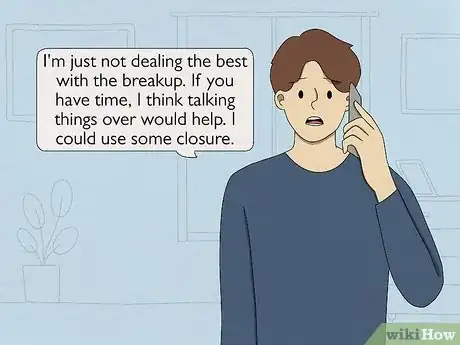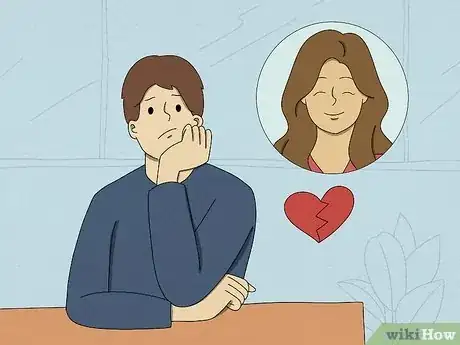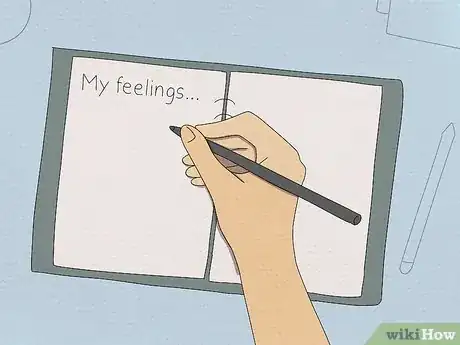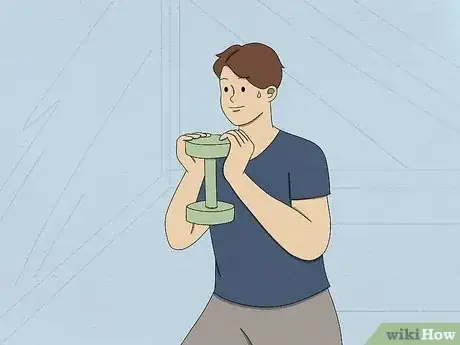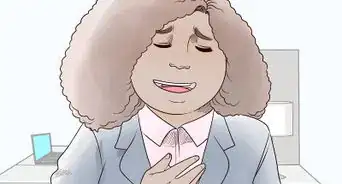This article was co-authored by John Keegan. John Keegan is a dating coach and motivational speaker based in New York City. He runs The Awakened Lifestyle, where he uses his expertise in dating, attraction, and social dynamics to help people find love. He teaches and holds dating workshops internationally, from Los Angeles to London and from Rio de Janeiro to Prague. His work has been featured in the New York Times, Humans of New York, and Men's Health.
There are 8 references cited in this article, which can be found at the bottom of the page.
This article has been viewed 100,790 times.
Breakups can be confusing, especially if you don't feel like you were given a reason. If your boyfriend left you suddenly, you may be reeling from the loss. If you're still on speaking terms, see if your ex would be willing to talk to give you closure. If things are still awkward, try talking it out with a friend. Keep in mind, you may not always understand why. Human emotions are complicated, and the reasons for a breakup may be hard or impossible to understand. Give yourself time to grieve the loss, even if you can't find an explanation for it.
Steps
Talking to Your Ex
-
1Contact your ex. Give it a couple of weeks after the breakup. If you talk to him too soon, the conversation could prove too emotional to handle. After you've had some time to process, ask your ex to meet you to talk.[1]
- Make it clear you just want some closure. Make sure your ex does not feel intimidated or nervous about meeting up with you. Be courteous when you contact him.
- For example, you could say something like, "I'm just not dealing the best with the breakup. If you have time, I think talking things over would help. I could use some closure."
- If he refuses to talk about it with you, say something like, "Okay, I understand that it might be hard for you to talk about this. Thank you for taking my call. I wish you the best."
-
2Pick a neutral location to talk. This is important as the situation will be emotional. A neutral location will allow you to better keep your composure as you talk over the breakup.[2]
- You should pick a place that's somewhat private. However, you don't want a location where either of you would feel uncomfortable. Having your ex over to your place may be weird, but a crowded restaurant would make conversation difficult. A quiet coffee shop would be a good in-between option.
- Pick a location without any emotional attachment. Do not, for example, choose to meet in the coffee shop where the two of you had your first date.
Advertisement -
3Understand you're not getting back together. You do not want to go into this conversation with false hope. Even if you're missing your ex, remember that this is not a means to get back together.[3]
- You may want your ex back for a variety of reasons. Seeing him may trigger certain feelings. You may think there's a slim chance the two of you will reconcile if you spend time together again.
- Put these feelings out of your mind. Remind yourself that you're just gaining closure and perspective.[4] You should also keep in mind this conversation will not cure all bad feelings. You will still experience sadness for the loss. You just may have a better understanding of why it happened.
-
4Share your positive feelings first. This will help set the tone for a positive conversation. Start off by expressing gratitude for the time you have had with your ex. You do not want to go into the conversation seeming combative or angry.[5]
- You can start off by talking about your ex's positive qualities or your best memories of the relationship. Bring up what you valued and gained from the romance.
- For example, "I really appreciate the time we spent together. You were always very kind and loving to me, and I will always know how I deserve to be treated in the future."
-
5Ask that your ex be honest with you. Once the two of you have shared good memories, you can ask about the breakup. Try not to sound angry or resentful. Just politely ask your ex to give you an explanation.[6]
- Do not start off with something like, "What did I do wrong?" or "What's wrong with me?" Instead, phrase things in a calm and mature fashion.
- For example, you can say something like, "I'm just having a hard time dealing. I was wondering if you could tell me what could have been better about our relationship. Knowing why things ended would help me move forward."
-
6Try to end on a good note. You do not want to end things in an awkward place, especially if you want to remain friends with your ex. After the talk, try to leave the situation in a manner that allows you both to feel positive.[7]
- Thank your ex for taking the time to talk to you. Leave the door open for future communication. Say something like, "If you ever want to get together again, let me know."
- If you feel comfortable, try giving your ex a quick hug goodbye.
Making Sense of Things Alone
-
1Talk things over with a friend.[8] Choose an empathetic friend who is a good listener. Say you need to vent about the breakup. Have this friend listen as you reflect on the breakup.[9]
- Make sure you select a friend who is a good listener. A friend who tends to interrupt, or give advice, is not the best option.
- Self-reflection can help you understand the loss. As you go over the relationship with a friend, you may begin to see what went wrong. You can process the information out loud, which can allow you to see something you missed before.
- Let your friend know exactly what you need from them. Whether it's a shoulder to cry on, someone to bring you out for a good time, or a fellow person to be angry with, your friend should know what you want from them.
- For example, you could say, "Thanks for listening to me, Jen. I know I've talked a lot about this breakup with you, and I really appreciate that you're taking the time to listen. I need to talk this through again to help me understand what happened."
-
2Write out your feelings.[10] As with talking, writing is a great form of self reflection. Try writing down your thoughts in a journal. You can also write a letter to your ex you do not intend to send. Here, you can talk about your confusion and sadness over the breakup.[11]
- You can express anything you wanted to say to your ex but could not. Talk about what you loved about the relationship, but also what was frustrating. Do not censor yourself. Just let your thoughts unfold.
- You may gain some insight through writing. As you write about the relationship, you may have a realization about why it ended. You may, for example, start to see you and your ex were very different as you write things down.
-
3Ask certain questions. This can help you gain insight. During a period of self reflection, ask yourself hard questions about the relationship. The answers to these questions may help you understand why things ended.[12]
- Were you and your ex really right for one another? Think about whether you were compatible long term. Did you have different interests and goals? Were you personalities always compatible? [13]
- Were the two of you really in love? Love does fade over time. It's possible the passion had drained from the relationship.
- Were there any differences you missed before? Some differences and disagreements are hard to reconcile.
-
4Accept you may not get closure. It's not always possible to understand why a relationship ended. Human beings are complicated. You may not get an understandable answer, even if you were able to speak to your ex.[14]
- Try to come to terms with the fact there will always be confusion surrounding a breakup. Even if your ex were to explain, there's a chance you would not understand or accept his explanation.
- Remember, you can heal from the breakup without closure. While it can be helpful to know why things ended, it is not necessary to move forward.
- Ask yourself if knowing why it ended will make it hurt any less.
Understanding the Reasons
-
1Consider what was not working. If a relationship ended, there's a good chance something just wasn't working. Go back through the course of your relationship and think about the signs of trouble.[15]
- Did you two fight frequently? If so, you may just have not been compatible. While fighting is a normal part of any relationship, when you're fighting more than you have fun, that's a sign something is wrong.
- Did any of your feelings change during the relationship? Feelings may have faded. Even if you wanted to stay in the relationship, you may have been aware feelings were waning. This is a sign the relationship was coming to an end.
-
2Think about any disagreements you had. Go over your biggest arguments. What were you disagreeing about? Sometimes, there are differences that just cannot be reconciled. Unfortunately, sometimes a relationship cannot be saved.[16]
- Trust issues often tank a relationship. Was there infidelity at any point or even flirtation outside of the relationship?
- Maybe you two were just different people. Maybe you were more social than your boyfriend. He wanted to stay home a lot, while you wanted to go out with your friends on weekends.
-
3Understand he may have commitment issues. Some people get anxiety over committing to a relationship. A person with a phobia of commitment may be unable to differentiate between feelings of excitement at the beginning of a relationship and discomfort or anxiety.[17]
- People who fear commitment long for the connection of a romantic relationship. However, when they begin to feel close and comfortable with someone, they get nervous. They may end things just as they begin to get serious.
- Look at your boyfriend's past. Has he had a lot of other girlfriends? How long did these relationships last? If your boyfriend has a habit of getting involved fast and then breaking things off, this is a sign he has commitment issues.
-
4Think about whether he's mature enough to date. Not everyone is mature enough for a romantic relationship. This is especially true if you and your boyfriend are very young. Think about whether your boyfriend actually seemed ready for a romance.
- When you're young, dating is about learning about yourself and exploring new experiences. If you and your boyfriend are still in middle school or high school, it's possible he wasn't ready for a long term commitment. Maybe your ex-boyfriend values you as a person, but he simply wants to explore other things.
Healing from a Breakup
-
1Recognize what you're feeling. In the aftermath of a breakup, you may feel inclined to hide your feelings. No one likes dealing with feelings of sadness, but it's best to allow yourself to grieve.[18]
- Acknowledge your emotions. It's okay to feel angry, resentful, sad, or confused. Even if you don't like what you're feeling, embrace it.
- You may want to find ways to let your emotions out. You could watch a sad movie or read a sad book. You could also vent to a friend or family member about what you're feeling.
-
2Allow yourself time to grieve. You cannot expect you're going to get over the breakup in a matter of days. It's okay to feel sad, confused, and angry. Time and distance are vital to healing.[19]
- Cut yourself some slack. Do not feel like you should be over it by now, or that there's something wrong with you for not bouncing back quickly. Breakups are hard, and it's okay to take your time.
- There is no set timeline for you to feel better. Everyone grieves at their own pace. Don't feel like you have to be over it by a specific deadline.
-
3
-
4Avoid negativity. You may be tempted to feel bitter, especially if your ex broke up with you. However, fostering feelings of resentment is unlikely to help you heal. Instead, try to practice gratitude.[21]
- Do not sit around thinking negative thoughts about your ex. Do not pick at his flaws or wish him bad things.
- Instead, appreciate the time you had. Most romantic relationships do not work out in the long run, but they're an important learning experience. Even if this romance did not work out, there will more in the future.
Expert Q&A
-
QuestionWhat can I do to help me get over a breakup?
 John KeeganJohn Keegan is a dating coach and motivational speaker based in New York City. He runs The Awakened Lifestyle, where he uses his expertise in dating, attraction, and social dynamics to help people find love. He teaches and holds dating workshops internationally, from Los Angeles to London and from Rio de Janeiro to Prague. His work has been featured in the New York Times, Humans of New York, and Men's Health.
John KeeganJohn Keegan is a dating coach and motivational speaker based in New York City. He runs The Awakened Lifestyle, where he uses his expertise in dating, attraction, and social dynamics to help people find love. He teaches and holds dating workshops internationally, from Los Angeles to London and from Rio de Janeiro to Prague. His work has been featured in the New York Times, Humans of New York, and Men's Health.
Dating Coach Reach out to your friends and family to talk about your relationship and work through the breakup. If you don't want to discuss it with anyone, you can also try journaling about your feelings.
Reach out to your friends and family to talk about your relationship and work through the breakup. If you don't want to discuss it with anyone, you can also try journaling about your feelings.
References
- ↑ http://www.hercampus.com/love/relationships/how-get-closure-after-breakup
- ↑ http://www.hercampus.com/love/relationships/how-get-closure-after-breakup
- ↑ http://www.hercampus.com/love/relationships/how-get-closure-after-breakup
- ↑ John Keegan. Dating Coach. Expert Interview. 5 November 2019.
- ↑ http://www.hercampus.com/love/relationships/how-get-closure-after-breakup
- ↑ http://www.hercampus.com/love/relationships/how-get-closure-after-breakup
- ↑ http://www.hercampus.com/love/relationships/how-get-closure-after-breakup
- ↑ John Keegan. Dating Coach. Expert Interview. 5 November 2019.
- ↑ http://greatist.com/live/closure-how-to-get-over-a-breakup
- ↑ John Keegan. Dating Coach. Expert Interview. 5 November 2019.
- ↑ http://www.hercampus.com/love/relationships/how-get-closure-after-breakup
- ↑ http://sex.sofeminine.co.uk/mag/psycho/d1347/x10325.html
- ↑ John Keegan. Dating Coach. Expert Interview. 5 November 2019.
- ↑ https://www.psychologytoday.com/blog/freedom-grieve/201206/bad-breakup-how-get-beyond-closure
- ↑ http://kidshealth.org/en/teens/break-up.html#
- ↑ http://kidshealth.org/en/teens/break-up.html#
- ↑ http://psychcentral.com/blog/archives/2015/01/08/what-is-commitment-phobia-relationship-anxiety/
- ↑ https://www.psychologytoday.com/blog/me-we/201403/after-breakup-who-says-your-feelings-have-make-sense
- ↑ https://www.psychologytoday.com/blog/me-we/201403/after-breakup-who-says-your-feelings-have-make-sense
- ↑ http://greatist.com/live/closure-how-to-get-over-a-breakup
- ↑ https://www.psychologytoday.com/blog/freedom-grieve/201206/bad-breakup-how-get-beyond-closure
